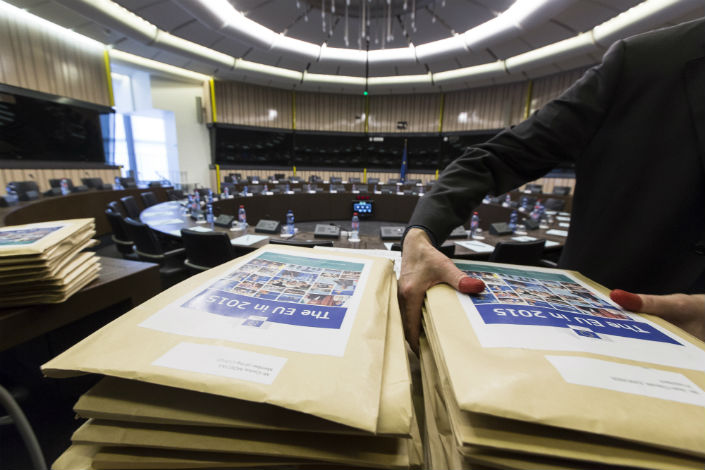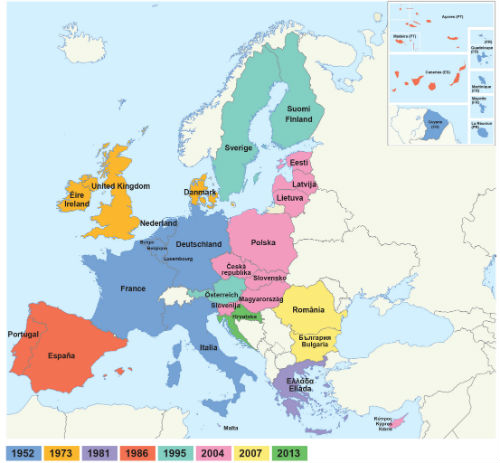Baptist life and its European context
Rather than engage in the economic case for staying in the European Union (EU), Tony Peck invites British Baptists to reflect on some aspects of our Baptist story and identity that might inform our vote

In 1609 a group of refugees from religious persecution in England made their way to The Netherlands and found a welcome in what was then a more tolerant society in Amsterdam. As Separatists from the English state church they brought with them their own convictions of what a church faithful to Jesus Christ should look like.
On the continent, as they interacted with the religious and political ideas of Europe, they both enlarged their theological vision and, from meeting continental Anabaptists, they espoused the then new, radical and dangerous notion of religious freedom for all, not just for themselves. With this they returned to England to begin Baptist life here.
Thus Baptist life was born into a European as well as an English context and deeply influenced by both. Rather than engage in the economic case for staying in the EU, I want to invite British Baptists to reflect on some aspects of our Baptist story and identity that might inform our vote.
In my work among European Baptists I have had several opportunities to see the work of the European Union close up. It needs reform. It needs to embrace different ways of belonging to it (as it has begun to do), and it needs to put right its collective failure to deal with the worsening refugee crisis.
But I believe that this is a moment for our country not to run from the challenges but to stay in solidarity with the other members of the EU and be part of the solution. There is evidence that if we do this there are other nations that will join is in a movement for reform and renewal. And there is already much more diversity in the way that member states relate to the EU than our own media and politicians will sometimes allow.
Our English Baptist roots stress the interdependence of churches, not the rugged independence that in some cases came later. From earliest times we have espoused the notion that as churches we need to help and counsel of one another and that this is a necessary part of being a local church. That in turn stirs within us a more genuinely inclusive attitude of connectedness and belonging that goes beyond our churches to the wider world.
 In the same way, island nation that we are, we need to understand the inter-dependence of nations today, and that at its best the European Union has sought to foster this sense of solidarity among a community of nations. It has played a major role in keeping the peace in Europe for the past 70 years.
In the same way, island nation that we are, we need to understand the inter-dependence of nations today, and that at its best the European Union has sought to foster this sense of solidarity among a community of nations. It has played a major role in keeping the peace in Europe for the past 70 years.
Such solidarity has had at his core the notion that the strong help the weak, with a special concern to promote the human rights of those suffering from poverty, persecution or injustice. That was certainly the vision of the solidarity of Europe of the Christian founding fathers of the EU, a vision that sometimes becomes submerged when the EU is only seen as a vehicle for economic prosperity.
Today we live in an amazingly complex and increasingly interdependent world. ‘Sovereignty’ in terms of the possibility of complete independence for our country to act as it pleases is in fact a convenient myth, and in any case for those who profess Christian faith there is only one source of true sovereignty.
As Baptists we share with other free churches a concern for the protection of minorities. We look back to 1612 and the ground-breaking conviction of Thomas Helwys for religious rights and freedom for all, including those of other faiths and specifically Muslims. There was here a vision of an open tolerant society that made space for its religious minorities.
It may not be widely known that the Lisbon Treaty included in the latest version of the EU Constitution an open, regular and transparent dialogue with the churches of Europe. On behalf of Baptists, I myself have participated in some of these dialogues and have been impressed by the careful listening to the churches by those representing the institutions of the EU. This is especially true when we are highlighting how churches can contribute to the common good and address the situation and rights of minorities right across the EU.
At their best, Baptists have embraced a generous internationalist spirit, open to the connectedness to brothers and sisters in Christ in other nations, and cultures. One of my concerns about both the Referendum campaign and what might be the reality of Britain outside the EU, is that it may well make our national spirit less generous and welcoming, somehow giving ‘permission’ for more xenophobic tendencies to surface and even to be translated into policy.
In the end some will want to argue that the UK can do and be all these things outside the European Union. My experience of serving the European Baptist family that is found in nations both inside and outside the EU convinces me that being outside will undermine the fundamental solidarity between the nations of Europe on which the EU was founded. I continue to believe that this sense of solidarity is a profoundly Christian value that will be best served by remaining in the EU family of nations.
Pictures (European Commission Audiovisual Service):
View of the European Commission room
Map of the enlargement to 28 EU member countries
The Revd Tony Peck is General Secretary of the European Baptist Federation
Related:
"Brexit is the solution" The decision facing voters in the forthcoming European Union referendum is an overwhelmingly political one - and there are three key areas why it will be better for the UK to leave, writes Baptist minister Ian Tutton
The EU Referendum - what does it all mean? A Baptist pastor has produced two guides to the EU referendum, one for everyone and one for those who are interested in thinking about this theologically
Baptist Times, 09/03/2016